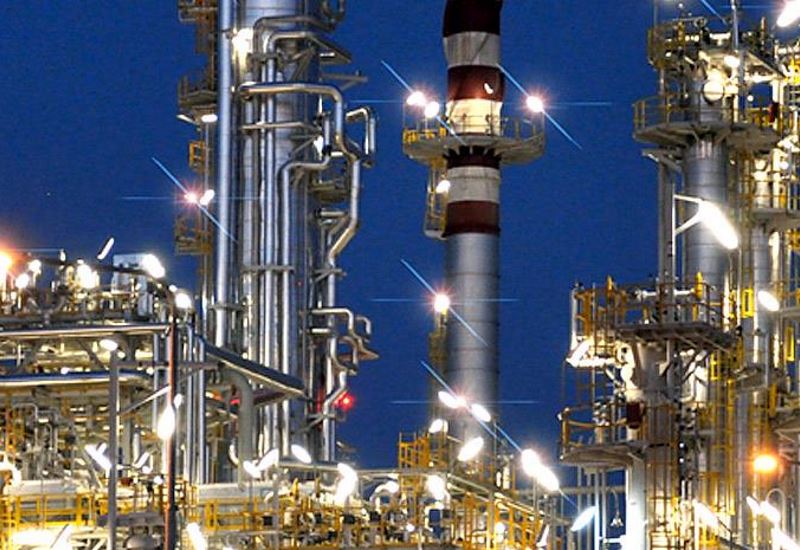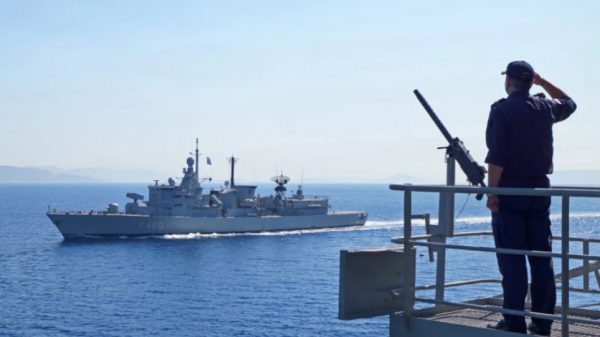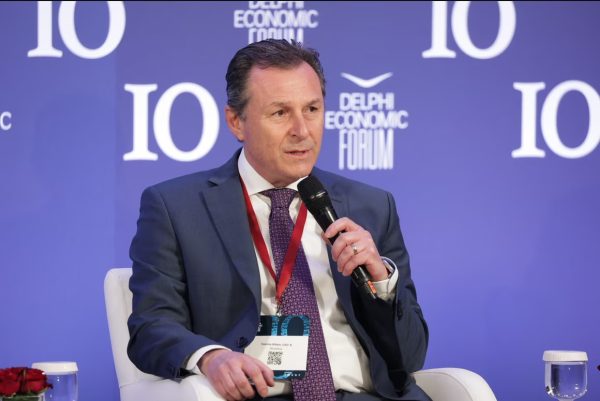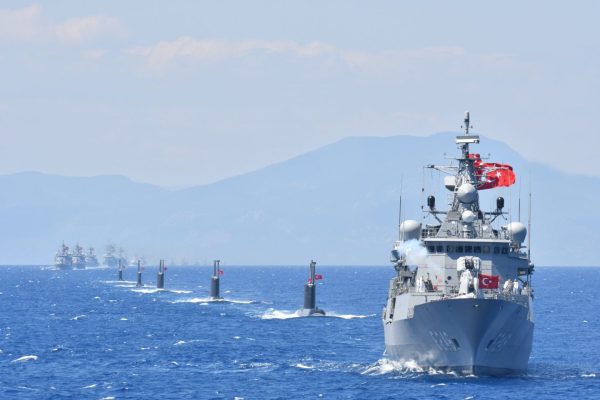
The oil refining complex of Motor Oil in Agios Theodoros of Corinth completes half a century of life this year.
The refineries, according to Nielsen, are one of the most modern in Europe with a degree of complexity of 11.54. The management, however, continues the investment program, seeking their further modernization and its adaptation to the modern requirements of sustainability and energy transition.
More specifically, these are six investments that lead Motor Oil refineries to a new era:
1. The naphtha complex
By the end of spring or the end of the summer at the latest, the large investment of 310 million euros for the new naphtha treatment complex is expected to be completed. The complex will help increase the production of high value-added gasoline as well as kerosene and hydrogen. The annual production capacity of the complex is expected to be about 1 million metric tons.
2. GAS Canal
In January, the market test for the strategic project of FSRU (floating terminal for receipt, temporary storage and gasification of Liquefied Natural Gas – LNG) will be completed, which will be located southwest of the Motor Oil refinery in the area of Agios Theodoros, Corinth. The GAS CANAL is included in the 10-year development plan of DESFA (2021-2030) and will be connected to the National Natural Gas System (NSF) via a land pipeline (which will be constructed with hydrogen mixing technology). The storage capacity of the unit is up to 210,000 m3, with a gasification capacity of 132,000 MWhs / day and an estimated annual demand of 2.5 bcm.
The results of the market test will be taken into account by the management of the group in order to make the respective decisions about the fate of the investment.
Objectives of the project are:
· Enhancing the availability of flexible energy sources.
· Ensuring competitive gas prices.
· The increase of the storage capacity of the Greek gas system by 80%, with immediate consequence the strengthening of the security of supply of the country. The importance of increasing LNG storage capacity is evident in times such as the current high prices in international markets and the country’s energy adequacy must be ensured at the lowest possible cost to the final consumer.
· The creation of a second southern gas import gateway to the southern tip of Greece, with the largest domestic consumption, as well as in Southeastern Europe, promoting natural gas in every corner of the country and in every home through tankers carrying Liquefied Natural Gas.
· Serving the increased demand for natural gas (due to new power plants) and the developing natural gas markets in Greece and the Balkans.
· The development of small-scale Liquefied Natural Gas applications, constantly contributing to the European and national strategy for reducing carbon emissions in the maritime sector.
Provisions for the import of hydrogen and renewable gases, so that the Gas Canal is considered a pioneering force in the transition to the new era using cleaner energy sources.
3. Digital transformation
The investments that have already been completed in the context of the digital transformation of the Motor Oil refinery amount to 3.6 million euros.
The company is proceeding to the full harmonization with the new Environmental Policies for Sustainability and Development, automating and digitizing the Health & Safety procedures of the refinery.
In this context, the modern Work Permit procedure has been implemented which enables the authorized personnel to perform every activity digitally. This ensures the safety and reliability of the required actions.
The completion of the Work Permit process is part of a larger IT Oil Hellas IT program, which is undergoing the transformation of refinery processes in every sector: Incidents, Control and Risk Management
4. Hazardous waste management unit
Last year, Motor Oil received approval from the Ministry of Environment and Energy to modify the refinery’s AEPO to invest in the construction of a treatment plant and the creation of a landfill for hazardous waste resulting from the operation of the refinery. The plans will be implemented at the refinery facilities. According to the modified AEPO, the hazardous waste treatment plant will have a capacity of 1,500 tons per year, while the landfill will consist of three cells with a total area of 9,921 sq.m. and a useful volume of 47,616 cubic meters.
The company always operates in the context of sustainable development and environmental protection.
5. Blue Med – Hydrogen
Blue Med is a project of Motor Oil that consists in the production of blue hydrogen, very low carbon footprint and green hydrogen, with a horizon of 2025. The project envisages the creation of a cluster of integrated production cycle of blue and green H2 for transport, distribution and use in industry and transport (buses and ships). The participation of DESFA and PPC companies as well as research institutes of the country is expected in the project.
6. The largest offshore berth
Just yesterday, Motor Oil announced the start of operation of the largest offshore berth in Greece (Multi Buoy Mooring), both in terms of ship size and depth.
This is an investment made in the refinery in Agios Theodoros. The project is of increased efficiency which gives greater flexibility to the refinery and can serve oil tankers with a capacity of over 300,000 DWT (Suezmax).
Motor Oil’s new offshore berth is a milestone in special port facilities in Greece and Europe and is developing economic activity in the wider region. At the same time, it ensures maximum security, through passive and active systems, while at the same time minimizing the footprint in the environment.
The unloading of crude oil from the vessel is done through two special double wall hoses, and through two underwater pipes are lead to a land basin and the tanks of the refinery. The two 32-inch pipes are located at a depth of 3 meters below the bottom and are protected by an outer cover and cement layers, while the natural surface of the seabed has been restored to its original form.
Latest News

Easter Week in Greece: Holy Friday in Orthodoxy Today
At the Vespers service on Friday evening the image of Christ is removed from the Cross and wrapped in a white cloth

Meloni and Trump Meet in Washington, Vow to Strengthen Western Ties
“I am 100% sure there will be no problems reaching a deal on tariffs with the EU—none whatsoever,” Trump stressed.

ECB Cuts Interest Rates by 25 Basis Points in Expected Move
The ECB’s Governing Council opted to lower the deposit facility rate—the benchmark for signaling monetary policy direction—citing an updated assessment of inflation prospects, the dynamics of underlying inflation, and the strength of monetary policy transmission.

Current Account Deficit Fell by €573.2ml Feb. 2025: BoG
The improvement of Greece’s current account was mainly attributed to a more robust balance of goods and, to a lesser extent, an improved primary income account

Hellenic Food Authority Issues Food Safety Tips for Easter
Food safety tips on how to make sure your lamb has been properly inspected and your eggs stay fresh.

Greek Kiwifruit Exports Smash 200,000-Ton Mark, Setting New Record
According to data by the Association of Greek Fruit, Vegetable and Juice Exporters, Incofruit Hellas, between September 1, 2024, and April 17, 2025, kiwifruit exports increased by 14.2%.

Easter Tourism Boom: Greece Sees 18.3% Surge in Hotel Bookings
Among foreign markets, Israel has emerged as the biggest growth driver, with hotel bookings more than doubling—up 178.5% year-on-year.

Greece to Launch Fast-Track Tender for Offshore Hydrocarbon Exploration
Last week, Papastavrou signed the acceptance of interest for the two Cretan blocks, while similar decisions regarding the two Ionian Sea blocks were signed by his predecessor

American-Hellenic Chamber of Commerce to Open Washington D.C. Branch
AmCham's new office aims aims to deepen U.S.-Greece economic ties and promote investment and innovation between the two countries

Why Greece’s New Maritime Spatial Plan Is a Geopolitical Game-Changer
This landmark development is more than just a bureaucratic step — it's a strategic declaration about how Greece intends to use, protect, and assert control over its seas








![Πλημμύρες: Σημειώθηκαν σε επίπεδα ρεκόρ στην Ευρώπη το 2024 [γράφημα]](https://www.ot.gr/wp-content/uploads/2025/04/FLOOD_HUNGRY-90x90.jpg)




![Airbnb: Πτωτικά κινήθηκε η ζήτηση τον Μάρτιο – Τι δείχνουν τα στοιχεία [γράφημα]](https://www.ot.gr/wp-content/uploads/2024/07/airbnb-gba8e58468_1280-1-90x90.jpg)












![ΙΟΒΕ: Πώς το δημογραφικό υπονομεύει την ανάπτυξη – Τι συμβαίνει στις ελληνικές περιφέρειες [γραφήματα]](https://www.ot.gr/wp-content/uploads/2025/04/dimografiko-600x375.jpg)











![Airbnb: Πτωτικά κινήθηκε η ζήτηση τον Μάρτιο – Τι δείχνουν τα στοιχεία [γράφημα]](https://www.ot.gr/wp-content/uploads/2024/07/airbnb-gba8e58468_1280-1-600x500.jpg)


 Αριθμός Πιστοποίησης
Αριθμός Πιστοποίησης